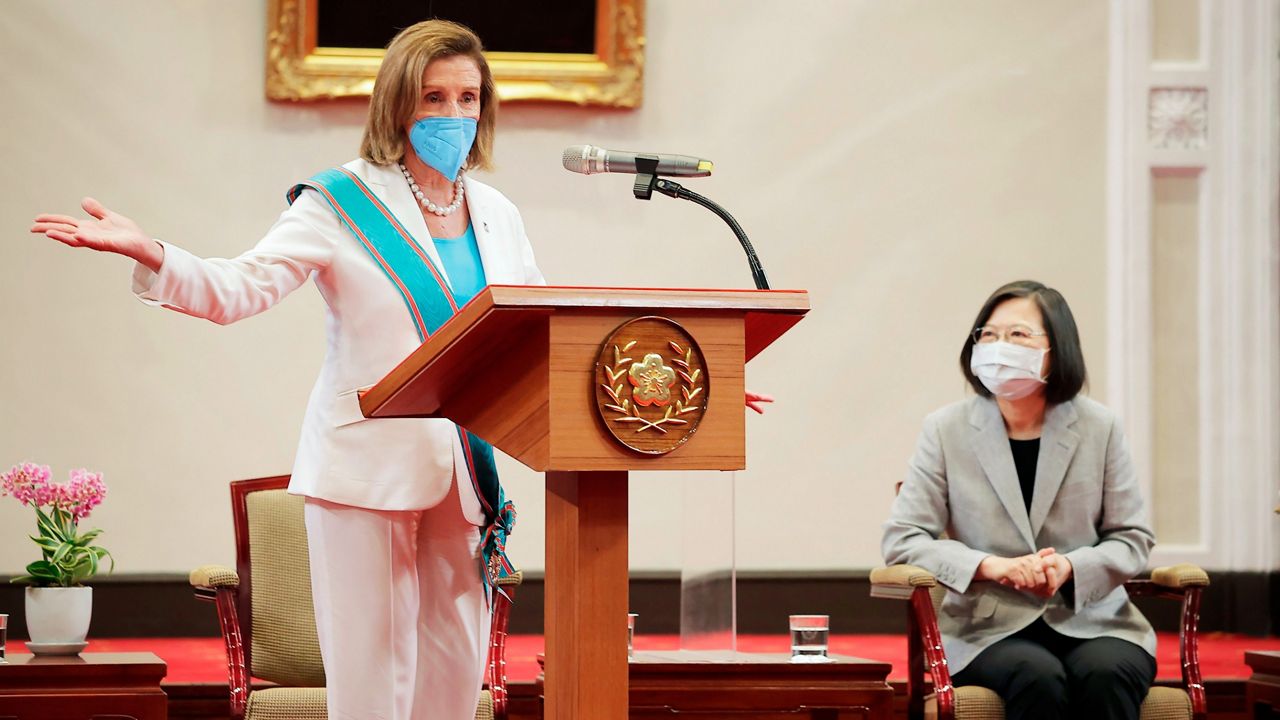House Speaker Nancy Pelosi said Tuesday her visit to Taiwan last week was “worth it” despite that it has escalated tensions between China, Taipei and the United States.
What You Need To Know
- House Speaker Nancy Pelosi said Tuesday her visit to Taiwan last week was “worth it” despite that it has escalated tensions between China, Taipei and the United States
- In her first interview since the trip, Pelosi told NBC’s “Today” show that she refused to allow China to isolate Taiwan
- Since her trip, China has held military exercises around Taiwan that have disrupted shipping and air traffic and substantially raised concerns about the potential for conflict
- Pelosi insisted her visit did not signal any change in U.S. policy and seemed to suggest sexism might be at the heart of China’s criticism
In her first interview since the trip, Pelosi told NBC’s “Today” show that she refused to allow China to isolate Taiwan.
“Just because … the president of China acts like a bully, has his own insecurities, it doesn't mean that I'm going to have him do the schedule for members of Congress,” Pelosi said.
Beijing warned that it would take “strong measures” if Pelosi followed through with the visit. Since her trip, China has held military exercises around Taiwan that have disrupted shipping and air traffic and substantially raised concerns about the potential for conflict.
Pelosi dismissed the military activity near Taiwan, saying, “What the Chinese are doing is what they usually do.”
Last week, Beijing announced it was canceling or suspending dialogue with the United States on a range of issues from climate change to military relations and anti-drug efforts in retaliation for Pelosi’s visit, which also included six other House Democrats.
When asked by Savannah Guthrie if she was concerned the visit could disrupt President Joe Biden’s efforts working with China on issues such as combatting climate change, Pelosi said, “What dialogue were you aware of that they were having on climate? They had been shutting down on many things.”
Pelosi seem frustrated about the controversy surrounding her trip, stressing she had bipartisan support.
“Let's just say this is not something that should be dividing us.”
The House speaker also seemed to suggest sexism might be at the heart of China’s criticism. She noted that a bipartisan Senate delegation that included Sen. Bob Menendez, D-N.Y., visited Taiwan in April.
“Why would they decide on my trip that it would be different?” Pelosi said. “It's only a matter of months. And even about a few weeks ago, before we went, a Republican senator went to Taiwan. So again, there's something wrong with this picture.
“And I'm used to taking the barbs about the men think it's this or that, but a woman goes and ... ,” Pelosi said before quickly shifting to praise for Taiwanese President Tsai Ing-wen.
Pelosi insisted her visit did not signal any change in U.S. policy.
“We still support the ‘One China’ policy,” Pelosi said. “We go there to acknowledge the status quo is what our policy is.There is nothing disruptive about that.”
The House speaker said the visit might have appeared to symbolic to some, “but it was very substantial to us for us to listen to the people in the region about our full agenda.”
China’s authoritarian-ruling Communist Party considers democratic, self-ruling Taiwan its own territory, to be annexed by force if necessary, and regularly advertises that threat by staging military exercises and flying warplanes into Taiwan’s air defense identification zone or across the center line of the 100-mile-wide Taiwan Strait.
Under the “One China” policy, the United States recognizes the People’s Republic of China as the sole legitimate government of China but has never accepted the Chinese Communist Party’s claim of sovereignty over Taiwan.
Though the sides lack formal diplomatic ties, the U.S. is Taiwan’s chief provider of outside defense assistance and political support, in a reflection of its desire to limit China’s growing influence and maintain a robust American presence in the Western Pacific.
The Associated Press contributed to this report



